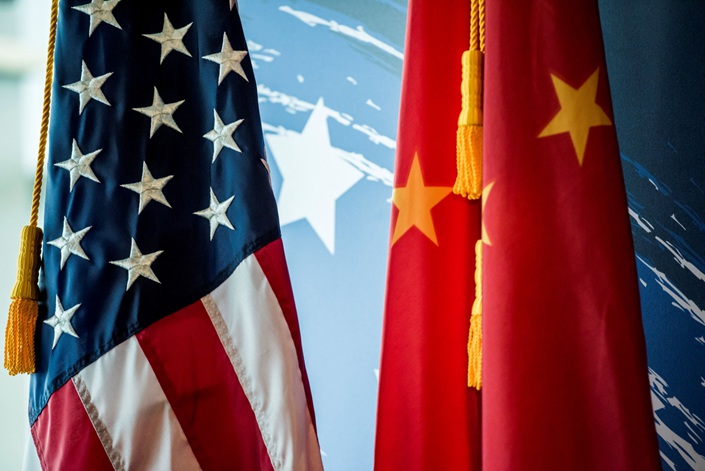Update: Phase One Trade Deal Rolls Back Tariffs, Expands Imports to China

China and the United States agreed on a phase one deal to pause the 18-month trade war, rolling back tariffs and increasing imports from America, Chinese officials and U.S. negotiators confirmed Friday.
The two countries worked out a nine-chapter accord including terms covering intellectual property, technology transfer, food and agricultural products, financial services, exchange rates and transparency, trade expansion, mutual assessment and dispute settlement, said Wang Shouwen, vice minister of commerce and deputy international trade representative, at a press conference Friday.
The agreement meets China’s needs to deepen economic restructuring and promote high-quality growth. Implementation of the accord will help enhance intellectual property protection, improve the business environment, expand market access and ensure legal rights of foreign businesses in China. It will also protect Chinese companies’ interests in doing business with the U.S., Wang said.
In a statement issued Friday, the Office of the U.S. Trade Representative (USTR) called the deal a “historic and enforceable agreement” and said the U.S. agreed to modify its tariff actions “in a significant way.”
The U.S. will maintain the 25% tariffs on about $250 billion of annual Chinese imports it imposed during the 18-month trade war, the USTR said. But it will halve the tariffs on an additional $120 billion of Chinese imports to 7.5%, the USTR said. China retaliated with similar measures.
The Chinese and American comments were the first official discussions of progress in trade talks since news broke Thursday that U.S. President Donald Trump signed off on an interim trade deal that would halt higher tariffs planned for Dec. 15 from going into effect.
Trump tweeted Friday that the U.S. would begin negotiations on the next phase of the trade deal “immediately, rather than waiting until after the 2020 Election.”
When asked about Trump’s tweet, Vice Finance Minister Liao Min said at the press conference that the second stage of negotiations will depend on the implementation of the first phase agreement.
The top priority now is to sign and implement the accord, Liao said. As for when follow-up consultations will start, it’s still up to both sides to continue to negotiate, he said.
Importantly, the agreement establishes a strong dispute resolution system that ensures prompt and effective implementation and enforcement, the USTR said.
As part of the agreement, the U.S. will roll back some existing and planned punitive tariffs on Chinese products step by step as well as exempt more Chinese products from being taxed in the future. Rising tariffs on Chinese products will be gradually reversed, Wang said.
China will increase imports from the U.S. under the agreement while considering “relevant arrangements” for tax levies on American products, including halting a scheduled Dec. 15 tariff increase, Liao said, without giving details.
The USTR said the deal requires “structural reforms and other changes to China’s economic and trade regime in the areas of intellectual property, technology transfer, agriculture, financial services, and currency and foreign exchange,” and includes a commitment by China to make substantial additional purchases of U.S. goods and services.
In the negotiations leading to the deal, the two sides reached a consensus in areas including the protection of trade secrets, intellectual property rights related to pharmaceutical products, the validity of patents, and cracking down on counterfeiting products, Wang said at the press conference. China will continue to revamp and improve its intellectual property protection system, Wang added.
Reuters reported Thursday that the U.S. would offer to cut existing punitive tariffs on Chinese goods by as much as 50% as part of the phase one deal. In return, China would agree to buy $50 billion of U.S. agricultural goods next year, double what it bought in 2017 before the trade war started.
Officials didn’t confirm those figures Friday. But China will expand imports of some agriculture products currently in urgent need, such as pork and poultry, Vice Minister of Agriculture and Rural Affairs Han Jun said at the press conference. The implementation of the deal will also help to boost China’s exports of agriculture products to the U.S., Han said.
The agreement is subject to necessary steps to finalize the text, and the two sides will discuss arrangements for a formal signature, officials said.
The press conference was held by China’s State Council Information Office, with attendance of Vice Chairman of the National Development and Reform Commission Ning Jizhe and Vice Foreign Affairs Minister Zheng Zeguang.
Contact reporter Denise Jia (huijuanjia@caixin.com)
Caixin Global has officially launched Caixin CEIC Mobile, a mobile-only version of a world-class platform for macroeconomic and microeconomic data.
From now on, all users can enjoy a one-month free trial on the Caixin App through December 2019. If you’re using our App, click here. If you haven’t downloaded the App, click here.

- PODCAST
- MOST POPULAR





